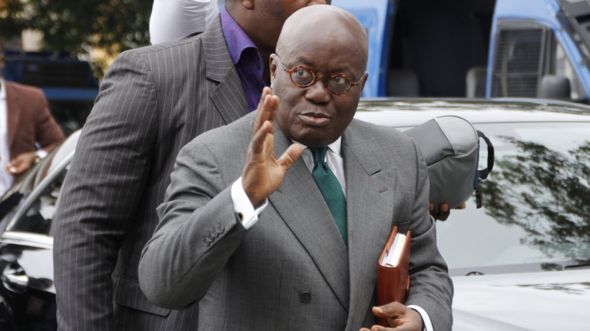Nana Akufo-Addo: Image copyrightAP
Nana Akufo-Addo, who also ran for president in 2008 and 2012 as Ghana's opposition leader won Wednesday's tightly contested presidential election.
It is important to note what happened next.
President John Mahama called Mr Akufo-Addo to admit defeat, a spokesman for his party said, as the Electoral Commission announced the result. This trend where african leaders concede defeat and ensure that peace reigns in their country has been strengthened by Mahama's concession.
Mr Akufo-Addo has promised free high-school education and more factories although critics have questioned the viability of his promises.
Ghana has been a multi-party democracy since the end of military rule in 1992 and this result is seen as reinforcing its reputation for the peaceful transfer of power between administrations.
Mr Akufo-Addo, from the New Patriotic Party, won the election on his third attempt to reach the presidency, after a campaign dominated by the country's faltering economy.
"I make this solemn pledge to you tonight: I will not let you down," he told a jubilant crowd in front of his residence.
"I will do all in my power to live up to your hopes and expectations."
Ghana's Electoral Commission (EC) declared Mr Akufo-Addo the winner, with 53.85% of the votes, while Mr Mahama took 44.40%. Turnout was at 68.62%.
PROFILE:
- 72 years-old
- Human rights lawyer
- Campaigned for a return to multi-party democracy under military rule
- A former justice and foreign minister in the NPP government from 2001 to 2007, he is running for president for a third time
- Main promise: Build a factory in each of Ghana's more than 200 districts
In the previous election in 2012, Mr Mahama, from the National Democratic Congress, defeated Mr Akufo-Addo by less than 300,000 votes.
Third time lucky for Nana Akufo-Addo
Official results by the Electoral Commission show that Mr Akufo-Addo of the New Patriotic Party (NPP) obtained more than 50% plus one vote required to beat his main rival, President John Dramani Mahama of the National Democratic Congress.
The president-elect will be sworn in on January 7 after a one-month transition period.
Mr Akufo-Addo had lost previous elections in 2008 and 2012 but the way he handled those losses resonated with many people.
He is credited with preventing possible violence in 2012 by not rejecting the outcome - a loss by 300,000 votes to current President John Mahama - and calling for mass protests.
Instead, he sought legal redress and accepted defeat after the Supreme Court upheld the result.
The 72-year-old son of former chief justice and ceremonial President Edward Akufo-Addo retained his 2012 electoral promise to provide free high-school education.
But the former lawyer, attorney general and foreign minister's main campaign promise was a "one district, one factory" policy that he says will industrialise the country.
The plan is to establish factories in each of Ghana's 216 districts.
"The time has come for us to move our industrial development forward," the presidential candidate told a rally in eastern Ghana.
"There must be jobs in our country. The lack of jobs, which is the case under this government, poses a threat to the future stability of our country."
In the north, Mr Akufo-Addo said there would be a functioning dam "in every village" to support agriculture.
His critics, mainly from the NDC, have dismissed his promises as impossible to fulfil - but Mr Akufo-Addo insists they are not just gimmicks.
Mr Akufo-Addo's wife Rebecca was part of his campaign. She told a TV show that he was a "very loving" family man.
"He is also passionate about his politics. He's always cared about Ghana and wanted to do his bit for his country," she added.
Mr Akufo-Addo is credited with helping to build up the NPP, which first contested an election in 1992 when Ghana returned to multiparty democracy after years of military rule.
His political career spans more than four decades and he was active in political movements in his early 30s, when he criticised the military government of the time.
He studied in both Ghana and the UK before working as a lawyer in France and served as an MP for the Abuakwa South constituency in eastern Ghana between 1996 and 2008.

